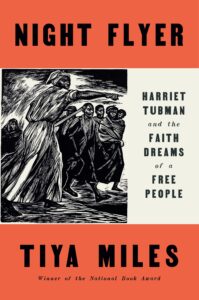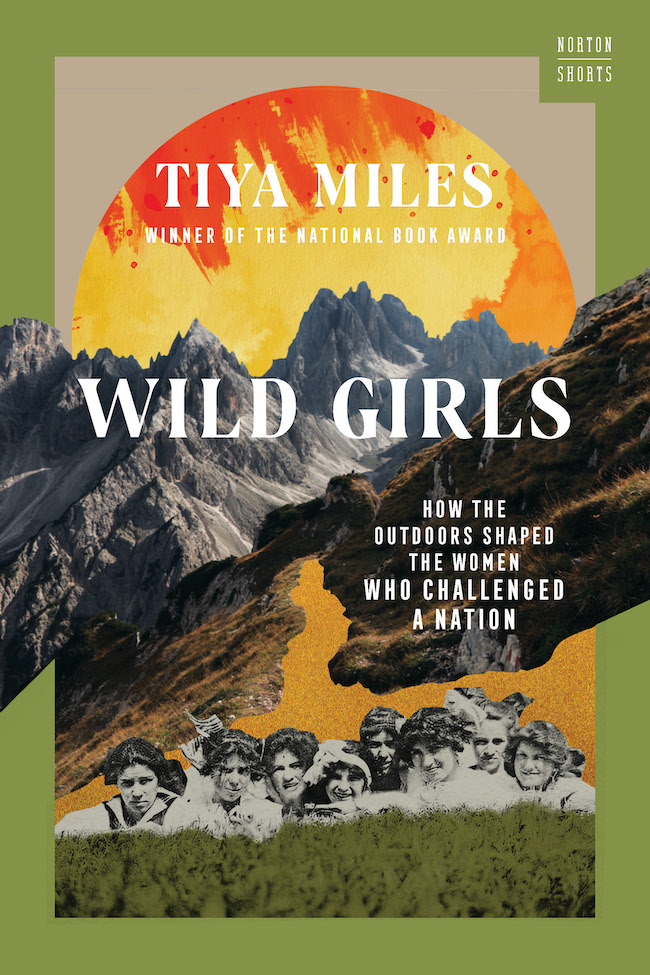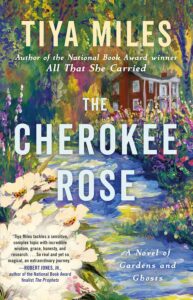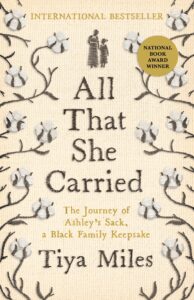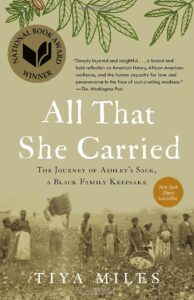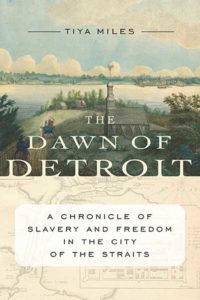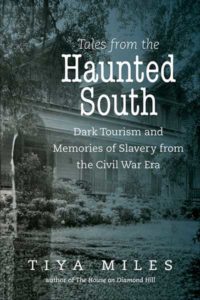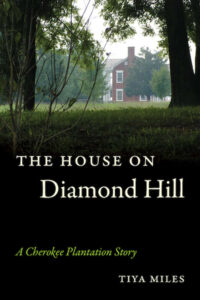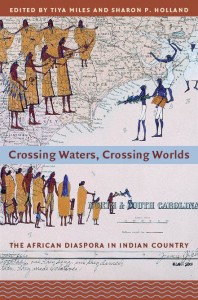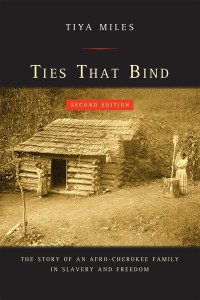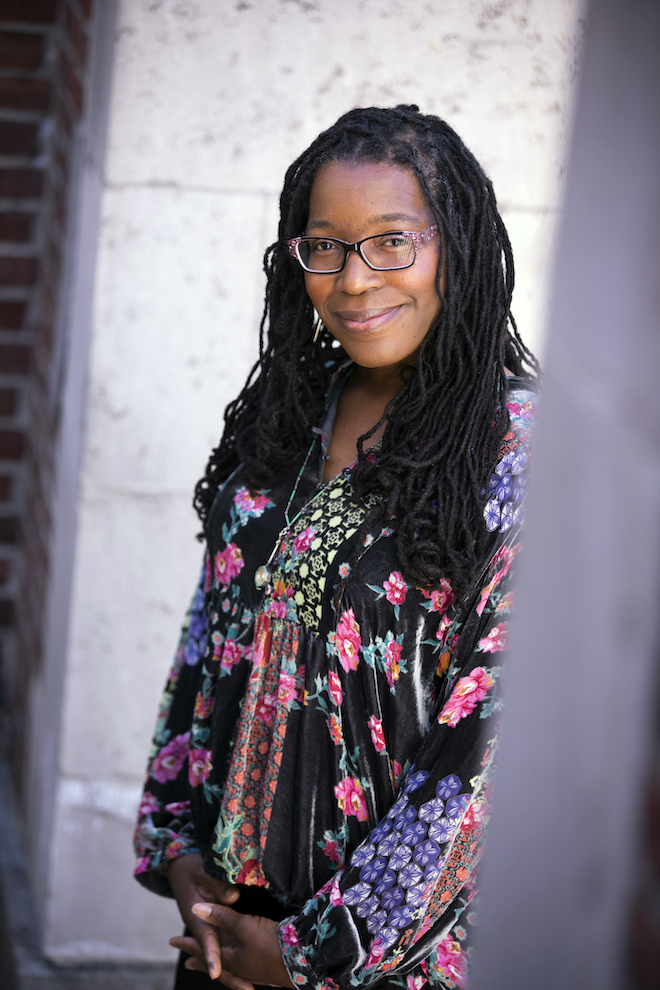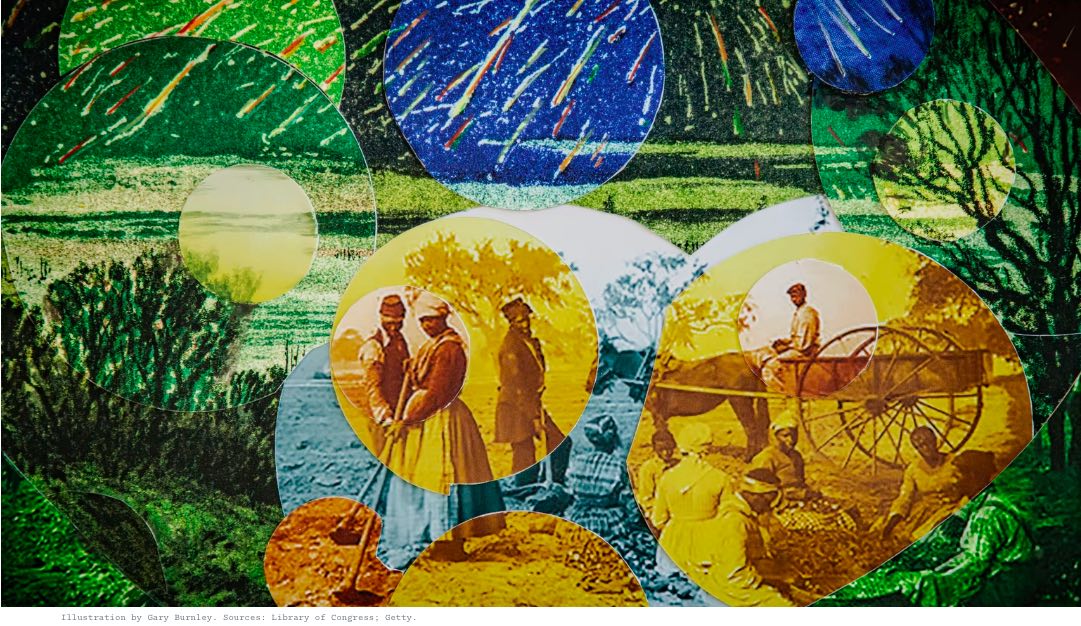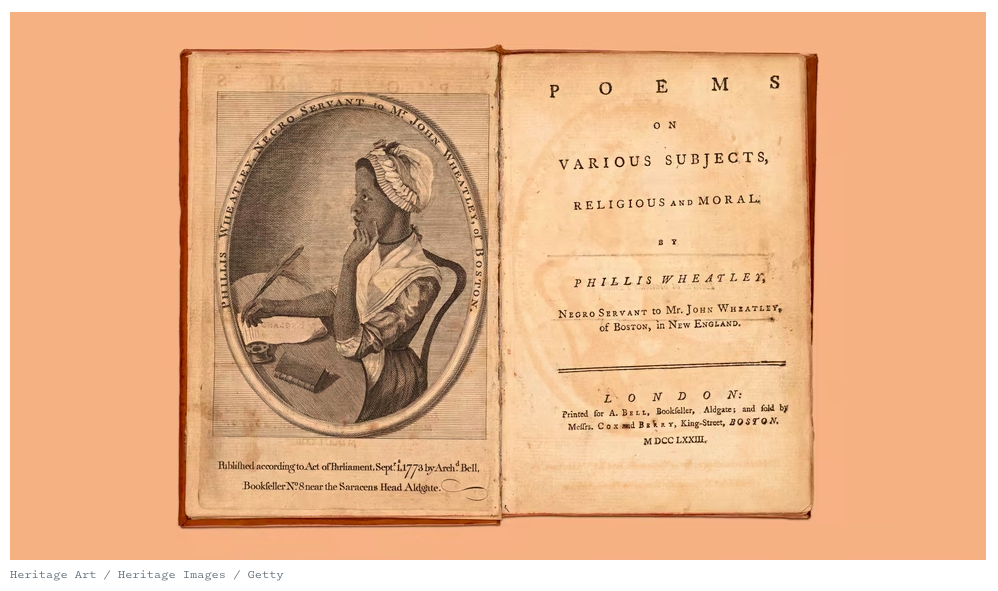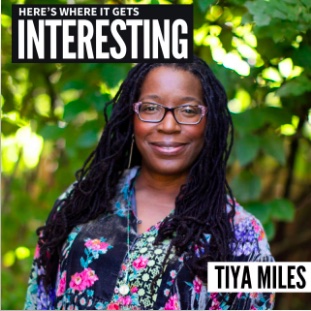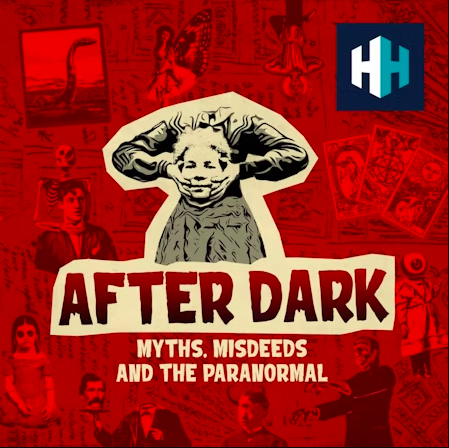Featured Book: Night Flyer
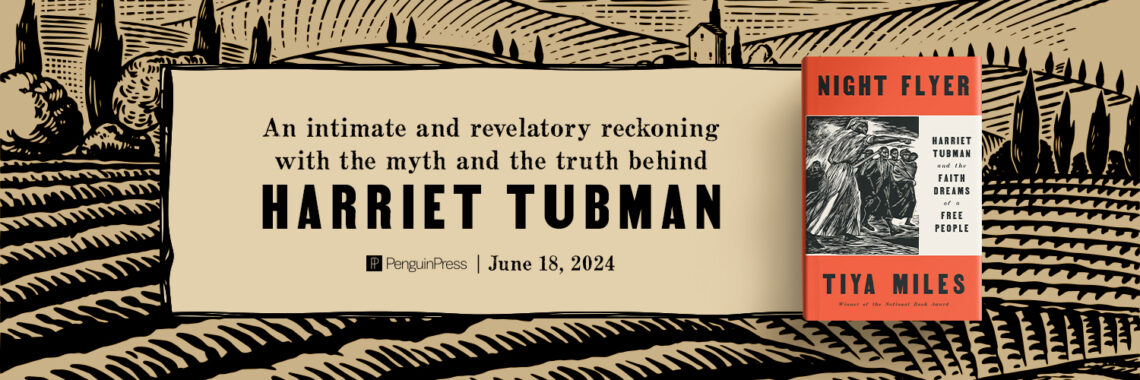
Harriet Tubman is, if surveys are to be trusted, one of the ten most famous Americans ever born and soon to be the face of the twenty-dollar bill. Yet often she’s a figure more out of myth than history, almost a comic-book superhero–the woman who, despite being barely five feet tall, illiterate, and suffering from a brain injury, managed to escape from her own enslavement, return again and again to lead others north to freedom without loss of life, speak out powerfully against slavery, and then become the first American woman in history to lead a military raid, freeing some 750 people. You could almost say she’s America’s Robin Hood, a miraculous vision, often rightly celebrated but seldom understood.
Tiya Miles’s extraordinary Night Flyer changes all that. With her characteristic tenderness and imaginative genius, Miles explores beyond the stock historical grid to weave Tubman’s life into the fabric of her world.
Available for purchase at your favorite booksellers
Harvard Historian Responds to Trump’s Order Targeting the Smithsonian
Trump is targeting the Smithsonian, the world’s largest museum complex, with an executive order designed to eradicate what he calls “a divisive, race-centered ideology” at the institution. Civil rights groups are hitting back, saying Trump is “whitewashing” America’s complex and troubled past. Award-winning author and Harvard professor Tiya Miles joins the Amanpour & Company on PBS to reflect on what this might mean for the future of the United States.
Originally aired on April 2, 2025

Announcing The 2025 PEN America Literary Awards Longlists
Night Flyer was longlisted for the PEN America 2025 Literary Awards prize in biography. Finalists for the awards will be announced at the 2025 Literary Awards Ceremony on May 8, 2025.
Read the announcement.

Bill’s Books: Women’s History Month
Bill Goldstein recommends Tiya’s book, Night Flyer, as one of his three recommended books written by women to celebrate Women’s History Month on NBC New York. Bill’s segment featuring Night Flyer starts at the 2 minute mark.
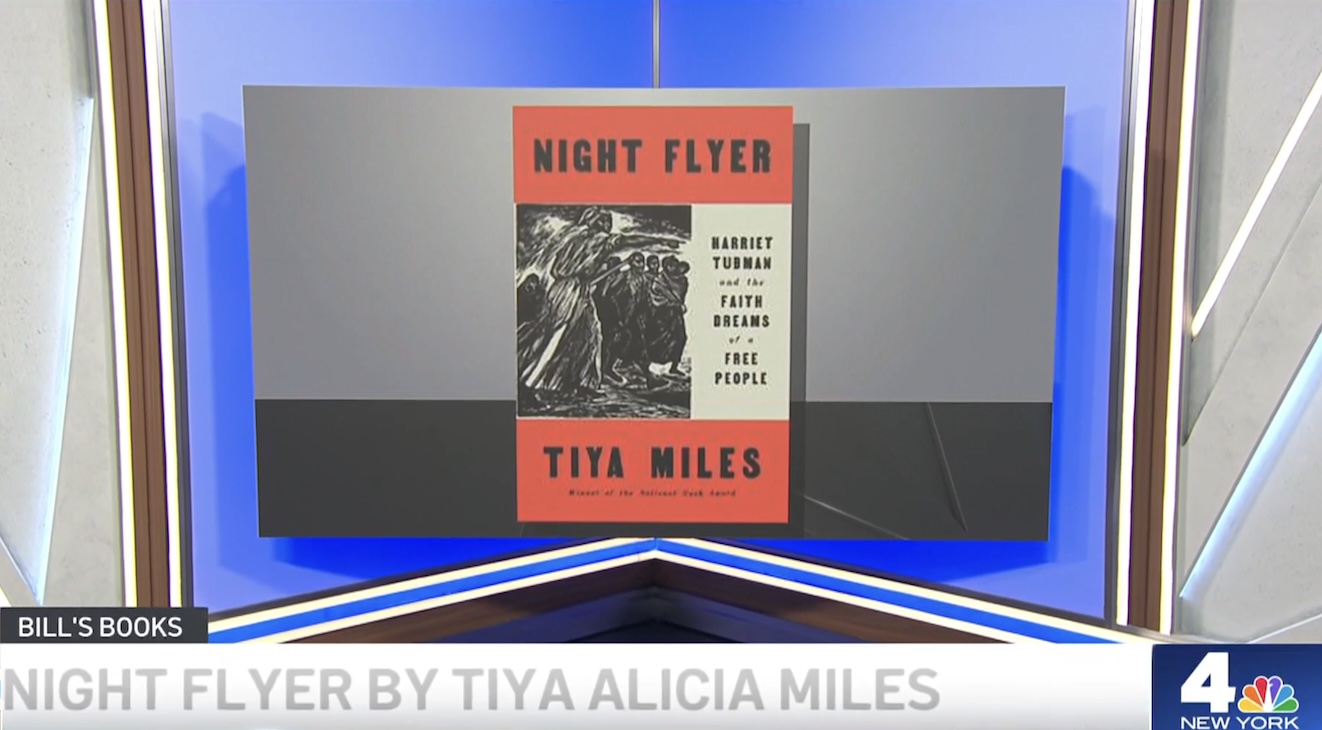
National Book Critics Circle Announces Finalists for Publishing Year 2024, Marking 50 Years of the Awards
NBCC announced Night Flyer is one of five finalists for their 2024 book award in the biography category. The winners will be announced in March 2025. Read the full announcement.

Harriet Tubman’s belief in God was central to her work for freedom
I suppose it’s just kind of lucky for me as a researcher that Tubman’s Christian faith really coincided with her understanding of and sense of the natural world. I brought these two things together and ended up writing a faith biography, which is really an eco-spiritual narrative, or eco-spiritual interpretation, of Harriet Tubman’s life.
Tiya talks with Faith & Leadership’s Aleta Payne about Harriet Tubman’s connection to nature and to God. Read Tiya’s interview.
New biographies reflect great changes in the writing of Black history
Tiya Miles’s stunning “All That She Carried: The Journey of Ashley’s Sack, a Black Family Keepsake” won the 2021 National Book Award for nonfiction. In “Night Flyer: Harriet Tubman and the Faith Dreams of a Free People,” Miles offers an “ecowomanist” account that portrays Tubman as a mystic who drew strength and knowledge from a God-Spirit. For Miles, the head injury that Tubman suffered as a child not only yielded spells of disability, but also opened access to visions and voices that delivered an unearthly understanding of the world — the one physically experienced as well as the one normally unseen. The themes of spirituality and ecology shape Miles’s presentation of a woman who was “startlingly spiritual and eerily smart” and “the most famous Black woman ecologist in U.S. history.”
Read the full review of Night Flyer in The Washington Post.
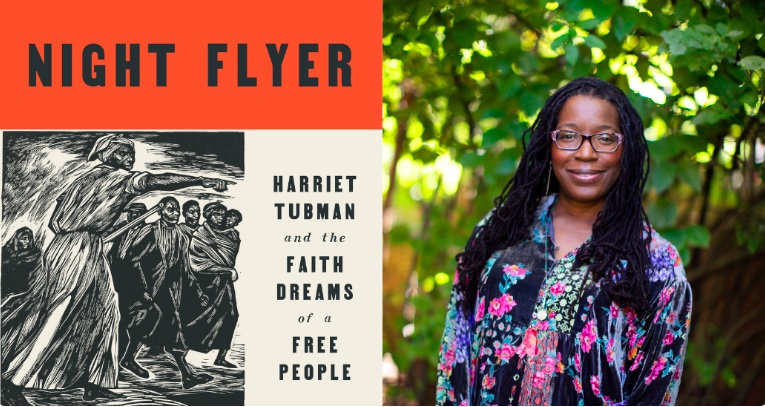
Author Discussion on Resistance Movements (August 24, 2024)
Alexis Pauline Gumbs (Survival Is a Promise) and Tiya Miles (Night Flyer) discussed the lives of abolitionist Harriet Tubman & civil rights icon and poet Audre Lorde.
Watch Tiya speak at the National Book Festival on C-SPAN.
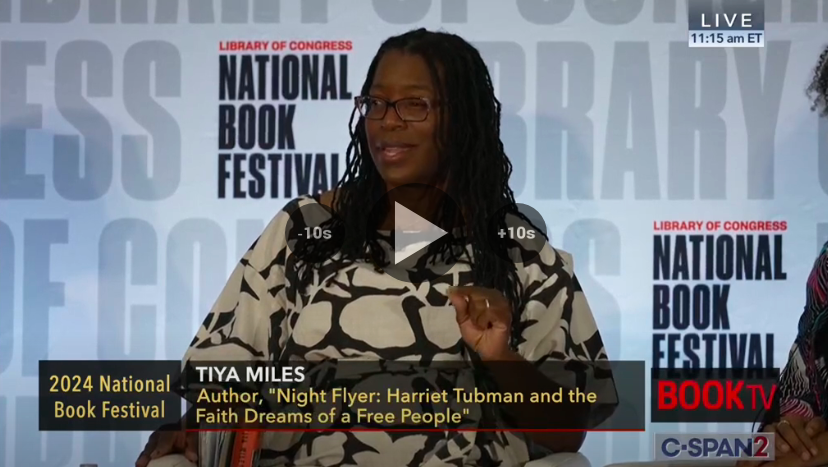
We Owe It to Harriet Tubman to Talk About Her Disability
And there are more than, there’s more than one way to think about this, and the only way we can think about it, as I, think, put it a moment ago, which is that despite all these things that she contended with, she still managed to move forward an incredibly visionary agenda around freeing people from slavery.
But there’s another way too, which is that because of everything she was experiencing and contending with, she did this.
Tiya joins Kendall Ciesemier on the podcast At Liberty, produced by the ACLU, to talk about her new book Night Flyer, connect past and present, and offer lessons from Harriet’s life that can help us build a future of collective liberation. Listen to Tiya’s interview.
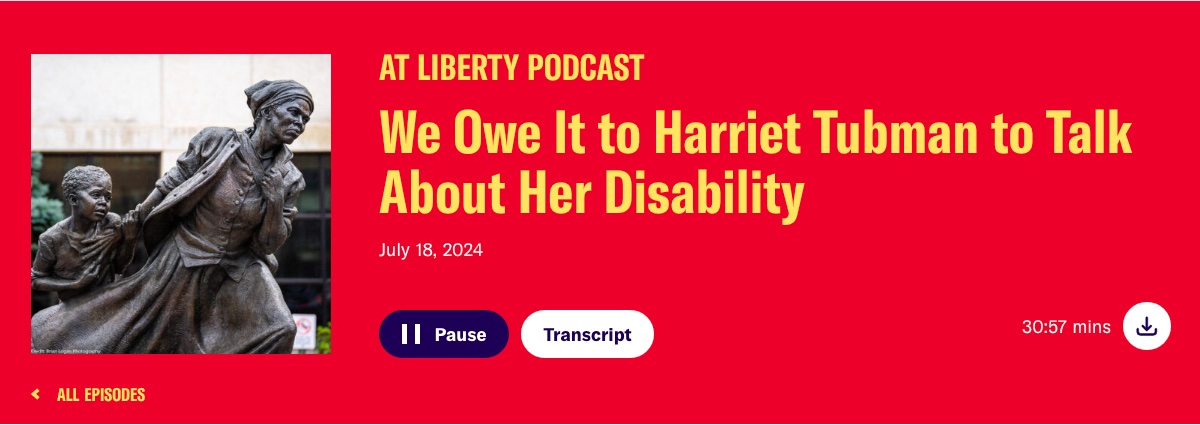
There is room for our Black heroes to be human
So the main thing I want people to take away from this book — the main thing that I took away working on the project — is a sense of Harriet Tubman as a real, live woman. A real, live Black woman. She was multidimensional and was always, in a very real way, at risk. She was always at risk. I think we can forget this when we just see pictures of her plastered around at certain times of the year.
Tiya talks with Keishel Williams at The Emancipator about expanding Harriet Tubman’s legacy. Read Tiya’s interview.

What Harriet Tubman did with rest of her life
Around the time of Hurricane Katrina, when the exposure of African American people to environmental harms became much clearer, I realized I wanted to write about Tubman and the ways she navigated her environment toward the ends of freeing herself and many others from slavery.
Read Tiya’s interview in The Harvard Gazette.

Harriet Tubman and Her World
On Juneteenth, Tiya spoke with Brian on The Brian Lehrer Show about her new book, Night Flyer: Harriet Tubman and the Faith Dreams of a Free People, that places Harriet Tubman in the context of the natural world she inhabited and her spirituality.
Listen now on The Brian Lehrer Show.

The Radical Faith of Harriet Tubman
“The little we know about Tubman’s motivations comes robed in Scripture and prayer—blinding garments for modern eyes, but Miles helps us see.”
Read The New Yorker’s dual review of “Night Flyer” and Edda L. Fields-Black’s new book “Combee.”
Harriet Tubman’s story told through lens of her faith, spirituality
In Night Flyer: Harriet Tubman and the Faith Dreams of a Free People, Tiya ‘draws on a plethora of sources, such as newspaper accounts, dictated letters and the experiences of enslaved women in an elegant, evocative, and empathetic account of Harriet Tubman’s “faith journey.”’
Read the full review in the Florida Courier.

Author Interview: Tiya Miles on Empowering the Memory of Harriet Tubman
“I wanted to move the needle past where many of us are with regard to Harriet Tubman, in which we think of her as this lone heroic figure. Actually, she was never alone, but did things that other people did not do.
I landed on a very common phrase that I found quite helpful, simply, “one of a kind.” It allowed me to say both things at once.” Read Riya’s full interview on The Arts Fuse.

How Harriet Tubman relied on nature to bring the enslaved to freedom
Tubman’s relationship with entities of the natural world was central to her work on the Underground Railroad. This article is adapted from “Night Flyer,” published June 18 by Penguin Press. Read in The Washington Post.

In ‘Night Flyer,’ author Tiya Miles takes a closer look at Harriet Tubman as a spiritual figure
‘Miles’s “Night Flyer” adds needed texture to Tubman’s historical caricature…’ Read the full review in The Boston Globe.

U of Minnesota alum Tiya Miles explores the spirituality of Harriet Tubman in ‘Night Flyer’
“Tiya Miles focuses on a relatively unsung aspect of Tubman’s life — her intertwined relationship with God and nature, which fueled her steadfast moral principles and aligned her with other 19th-century Black women of faith.” Read the full review.

Night Flyer — Harriet Tubman and her place in Black American history
“Miles’s Tubman is “startlingly spiritual and eerily smart”, “a guru for her time and ours” — not magical, but ferociously determined and astonishingly brave. By showing the nexus of relationships that guided her, Miles brings Tubman to vivid and rounded life.” Read the full review on the Financial Times.
National Book Award winner humanizes Harriet Tubman in ‘Night Flyer’
‘Pushing past the mythology of Tubman as the “hyperracial oddity” that previous biographers have portrayed, Miles takes painstaking care to present Tubman as a God-fearing freedom fighter in all her life stages.’ Read the full review on The Atlanta Journal-Constitution.

Night Flyer: Harriet Tubman and the Faith Dreams of a Free People
“With characteristic lyricism, Miles unspools a biography of Harriet Tubman that focuses on the inner life of the revolutionary figure and the outer forces that forged it: the wilderness, other women, and a life of transgression.” Read Publishers Weekly.

The Rescuer
“Night Flyer joins nearly a dozen biographies of Tubman, but it doesn’t march in a linear way through the same familiar chronology. Miles’s book is a world-building enterprise, with a novel’s sensitivity and a poet’s sensibility rooted both in Tubman’s daily life and in her more mystical inclinations.” Read the full review on The American Scholar.
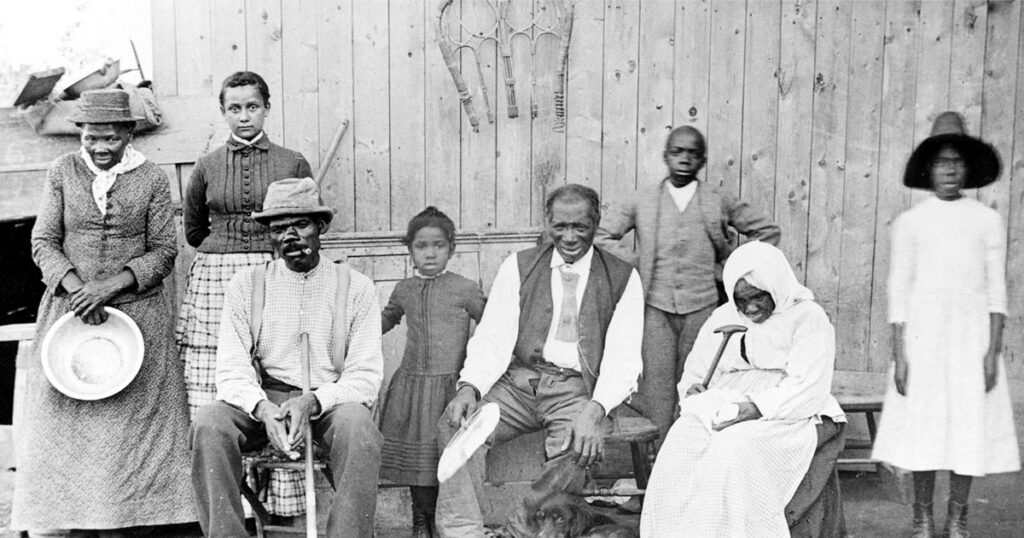
Tiya Miles, author of Night Flyer, in conversation with Melissa Bartholomew
Porter Square Books is thrilled to welcome Tiya, author and National Book Award winner, for the release of her latest book Night Flyer: Harriet Tubman and the Faith Dreams of a Free People.
Melissa Bartholomew, Associate Dean for Diversity, Inclusion, and Belonging at Harvard Divinity School, will join Tiya in conversation. This event will take place on Thursday, June 20 at 7pm at Porter Square Books.
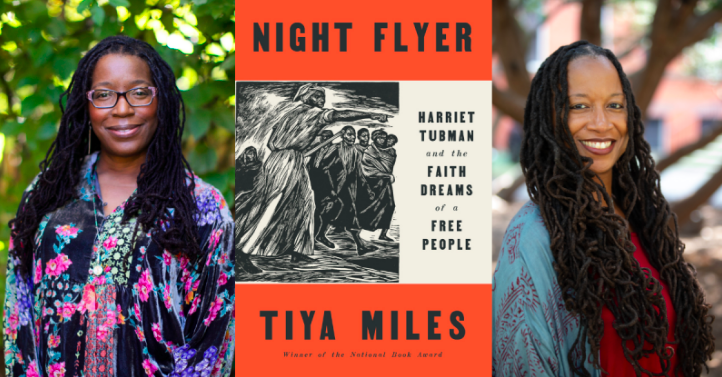
Wild Girls
Wild Girls: How the Outdoors Shaped the Women Who Challenged a Nation
Living on Earth takes a look at the history of women outdoors in America. From abolitionist Harriet Tubman to novelist Louisa May Alcott, some of the country’s most important women trailblazers shared a connection with the natural world in their girlhood. In Tiya’s book Wild Girls: How the Outdoors Shaped the Women Who Challenged a Nation, this time spent in the outdoors prepared these women to become pioneers in their fields.” Listen to Tiya’s interview with host Paloma Beltran for more.
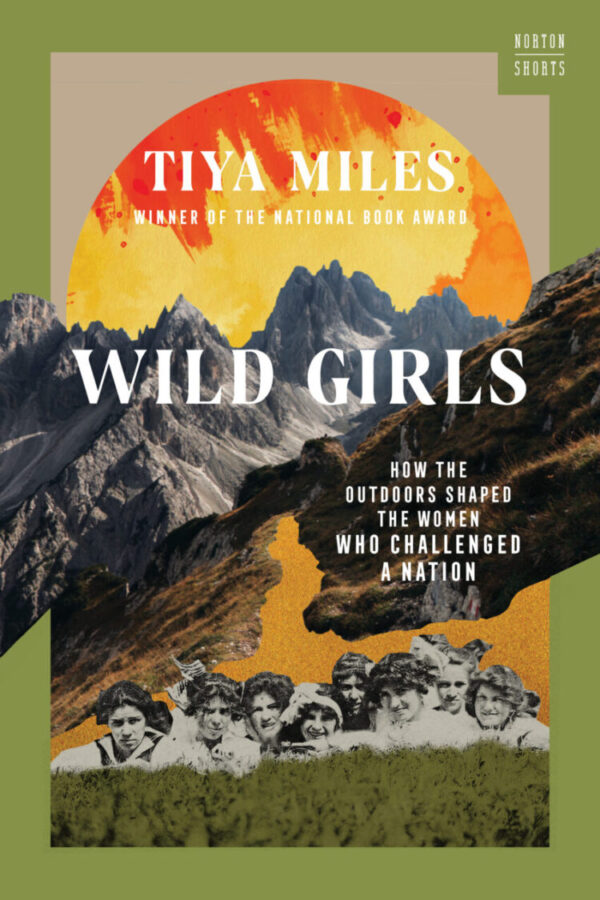
Could crabs be conscious, can you beat hypochondria and more: top reads for summer
Ten of Nature’s recent contributors share their current book obsessions, which includes Tiya’s book Wild Girls. Read Beronda L. Montgomery’s review of Wild Girls.
Exploring Wild Girls: A Q&A with Tiya Miles
In her interview with Norton Learning Blog, Tiya discusses the inspiration behind the project, what she hopes students will take away from the book, and more. Published JULY 16, 2024.
I aim to show that when we see girls as outside actors—individuals acting in relation to their specific environments—we can begin to understand familiar narratives and historical moments in new ways, and we can realize a finding of environmental history—that human culture and what we call “nature” are inseparable.

This Week’s Show
Listen to an interview with Tiya on Living on Earth’s This Week’s Show. To kick off Women’s History Month, we take a look at the history of women outdoors in America. From abolitionist Harriet Tubman to novelist Louisa May Alcott, some of the country’s most important women trailblazers shared a connection with the natural world in their girlhood. According to author Tiya Miles in her book Wild Girls: How the Outdoors Shaped the Women Who Challenged a Nation, this time spent in the outdoors prepared these women to become pioneers in their fields. She joins Host Paloma Beltran for more (interview begins at 16:02). Read the transcript of Tiya’s interview.
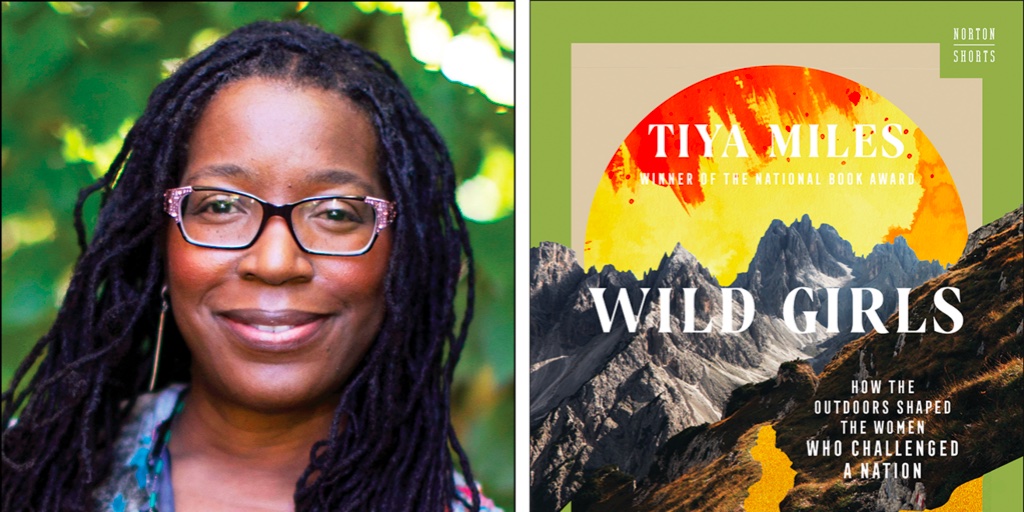
7 Inspiring Books About Women in Sports Who Defied Expectations
Aime Alley Card, author of “The Tigerbelles,” recommends stories that will make you laugh, cry, and make you believe that overcoming the odds is possible; including Tiya’s book, Wild Girls. Read Aime’s recommendations.

Tiya Miles Uncovers the Hidden History of Women in the Outdoors
Tiya shows how wild places shaped the lives of female trailblazers in her book, Wild Girls, and shares her favorite memories in nature along with some ideas on how we can make it easier for all people to enjoy the outdoors. Read the article in Outside Magazine.

How America’s Natural Beauty Called Generations of Women to Action
“Memory, for this young daughter of enslaved grandparents, is yoked to outdoor spaces with complex intergenerational meanings.” Read a published excerpt from Tiya’s book, Wild Girls, on Literary Hub.

Wild Girls (Starred Review)
If you, like Tiya Miles, were once a girl who found an expansive sense of wonder in wild spaces, you will love her book about the history of women in the outdoors.
Tiya Miles’ beautiful new book, Wild Girls: How the Outdoors Shaped the Women Who Challenged a Nation, opens with a provocative suggestion: Being outdoors—experiencing unfettered, wide, risky and exciting natural environs—can open one up in unique ways that defy gendered expectations.
Read this review as it appears on BookPage.

Girls gone wild — Harriet Tubman, Louisa May Alcott, and the freedoms they found outdoors
Craig Feldman from the Boston Globe talks with Tiya about her book Wild Girls. They discuss Tiya’s research for the book, some of the ways the natural environment shaped the women she writes about and how these women, in particular, challenge the narratives that many Americans grew up with. Read interview in the Boston Globe.

For America’s ‘Wild Girls,’ the Natural World Meant Freedom
From The New York Times book review:
Tiya Miles’s “Wild Girls” is a thoroughly absorbing exploration of the formative role that nature has played in American women’s lives. A beautiful synthesis of diverse women’s experiences, combining history with memoir and a call to action, this brisk, elegant study — the first in a new series of “short” nonfiction books from Norton — demonstrates how the natural world functioned as a girlhood training ground for adult resistance to the country’s confining gender roles.
Read the full review in The New York Times.

Off the Shelf
“Wild Girls… is an utterly different encounter with nature—an invitation to seek out the untold ways humans and Earth interact. As a girl growing up in Cincinnati, Miles walked on the frozen Ohio River with her father in 1977. As a historian, she recalls the slaves who used it as an “ice bridge” to freedom in the early 1850s, right after passage of the Fugitive Slave Act of 1850—a bracing frame for her original take on girls’ encounters with the wild.” Read the article.

The Cherokee Rose
Beyond The Ghosts of the South w/ Professor Tiya Miles
In this podcast episode of Crawlspace – True Crime & Mysteries, Tim Pilleri & Lance Reenstierna travel to the Haunted South with Tiya to explore the impact dark tourism in the South had on Tiya and how it led her to shine a light on the realities of these tales. Listen to the podcast now.
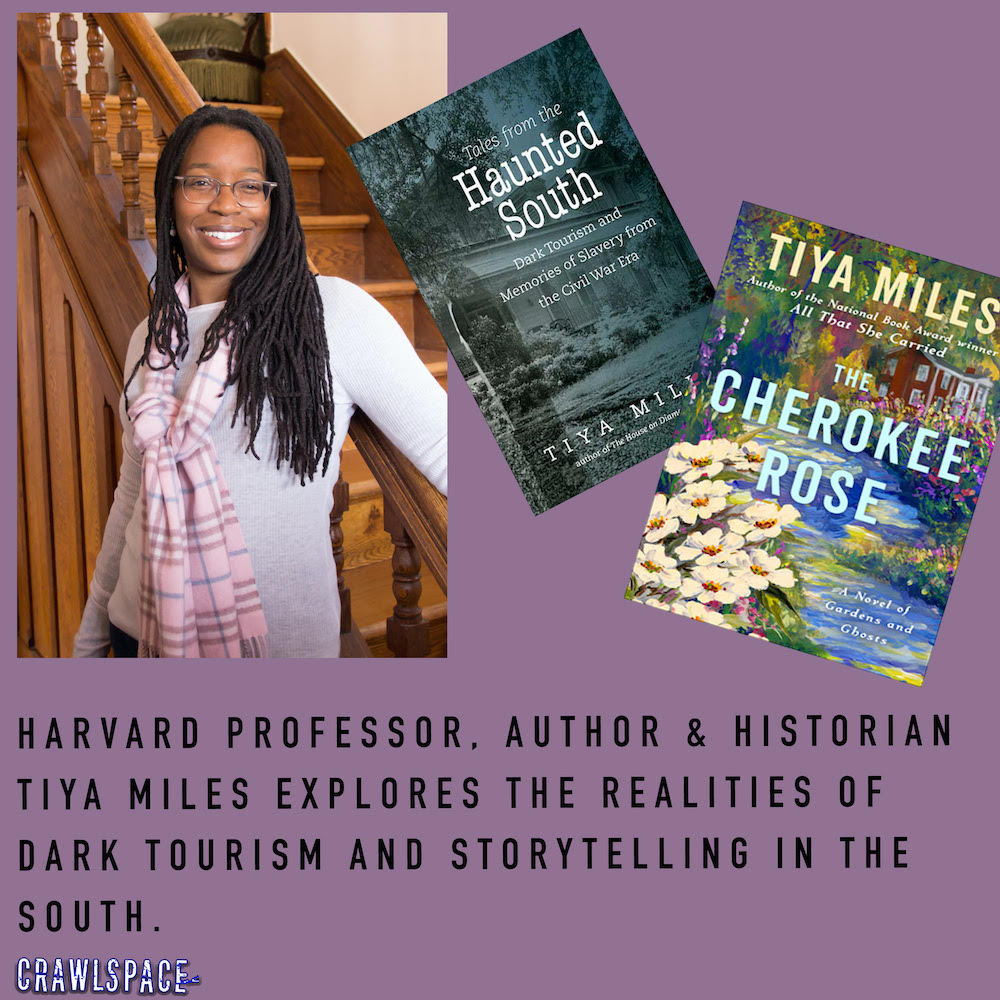
Reinspired by True Events
In a recent interview with The Harvard Gazette, Tiya discusses what inspired her first novel The Cherokee Rose and why a recent tribal reckoning led her to revisit it. Read her full interview.
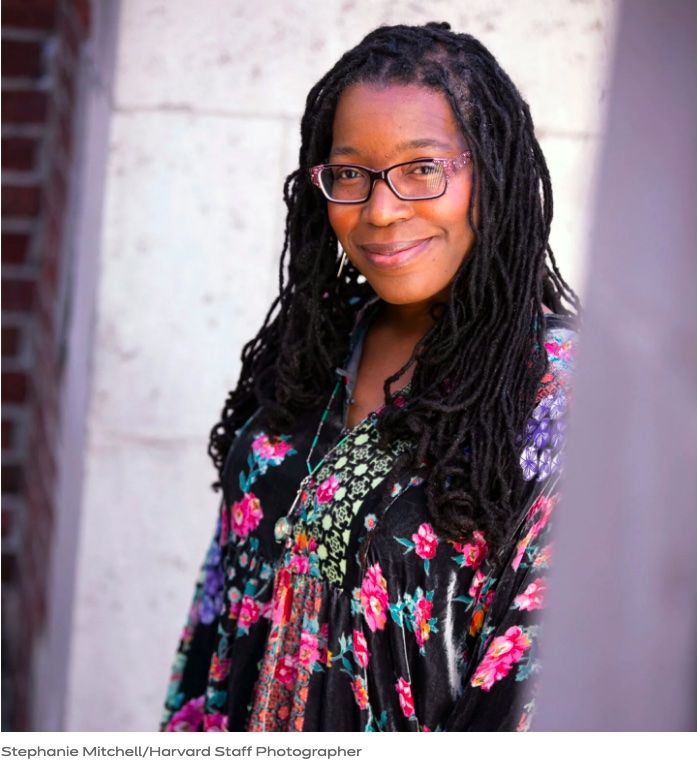
Q&A: How to Write Rural Historical Fiction, With Tiya Miles
In her interview with The Daily Yonder, Tiya discusses her process to writing historical fiction that accurately reflects the time and people featured in her work. Read her interview.
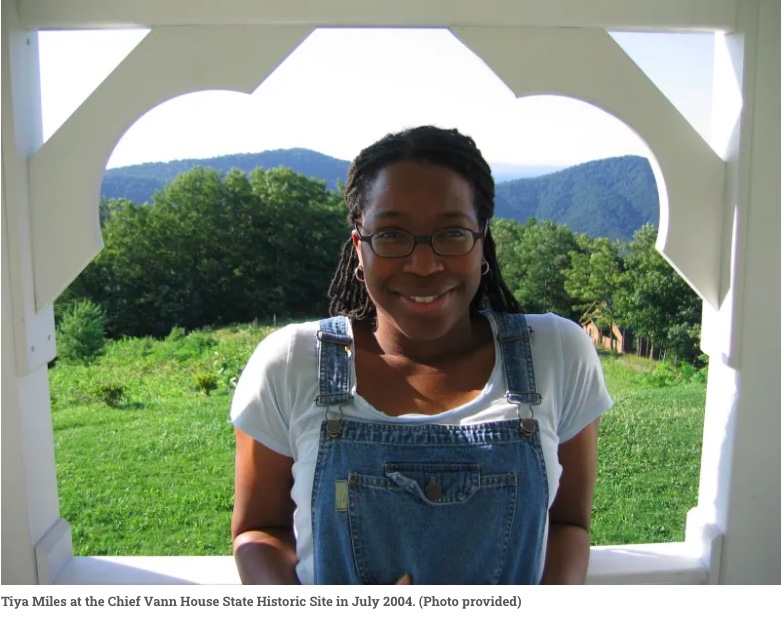
Tiya’s Interview on Art Works
On the podcast Art Works, produced by the National Endowment for the Arts, Tiya discusses the challenges of writing a novel as an historian, the freedom in fiction to explore new themes and ideas, and how her experiences writing her debut novel helped shaped her writing in All That She Carried. Listen to Tiya’s interview on Art Works.

All That She Carried
7 Thrilling Tales That Upturn What We Know about Black History
Susanna Ashton recommends Tiya’s All That She Carried, and a few other select books that model new ways to see Black history and American history, with all of its beauty and cruelty, afresh.
“A sack? A book about a bag? What can we learn from looking at a particular object, in this case, a small cotton bag filled with tokens of love for 9-year-old Ashley, a child about to be sold away from her family?… There is so much urgency in this work—it calls us to see things that have been discarded for what they are and what they can be.”

Electric, poignant, exquisitely written: inside the inaugural Women’s prize for nonfiction shortlist
The award’s chair of judges explain why they chose Tiya’s book, All That She Carried, as one of the final six contenders for the inaugural Women’s prize for nonfiction.
Carefully judged, deeply researched, and exquisitely written, All That She Carried is a masterclass in how to contend with the absences of enslaved people in the archives. It brims with intelligence and love.

In conversation with Tiya Miles
The Women’s Prize Trust spoke to Tiya about her writing, research and current reads. Read Tiya’s interview.
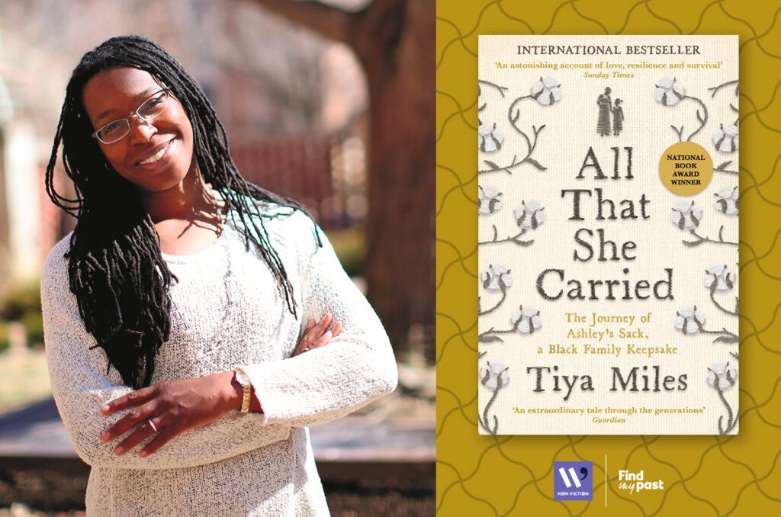
Five Best: Books on Unsung Women
All That She Carried was selected by Leah Redmond Chang, the author of Young Queens: Three Renaissance Women and the Price of Power as one of the five best books about unsung women.
Tiya Miles rethinks the nature of black women’s legacies: cultivated over decades, they are built through stories told by mothers to daughters, memories inscribed onto the objects that they carry and pass onward.

Read All About It
Brooke Gladstone’s interview with Tiya on her award-winning book All That She Carried is revisited in this episode of On The Media. ‘We could just throw our hands up and say, “We can’t find what we need, so we can’t tell these stories,” but that would be an additional injustice on top of the historical injustices.’ Listen Now. (Tiya’s segment begins at the 32:46 minute mark.)

All That She Carried — the extraordinary history of a mother’s gift
Tiya’s book, All That She Carried, is “a powerful dissenting narrative and “[as] this extraordinary study goes on to show, it’s also a means by which to illuminate the experiences of millions of enslaved people whose voices have been silenced.” Read more in the Financial Times.
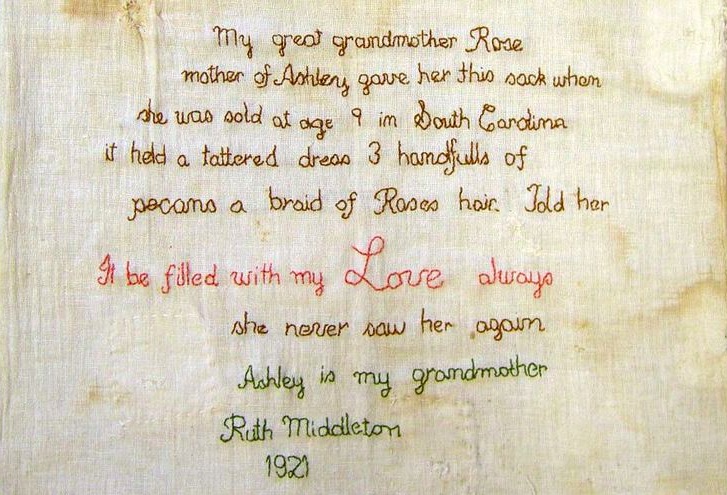
All That She Carried by Tiya Miles review – social fabric
“The Harvard historian Tiya Miles has taken a bold and innovative approach to this problem in All That She Carried, a bestseller when it came out in the US last year, now published for the first time in Britain.”
“All That She Carried finds a way to give voice to the wordless by using a mundane, domestic object – a cloth sack and its contents – to thread an extraordinary tale through the generations.” Read the review in The Guardian.
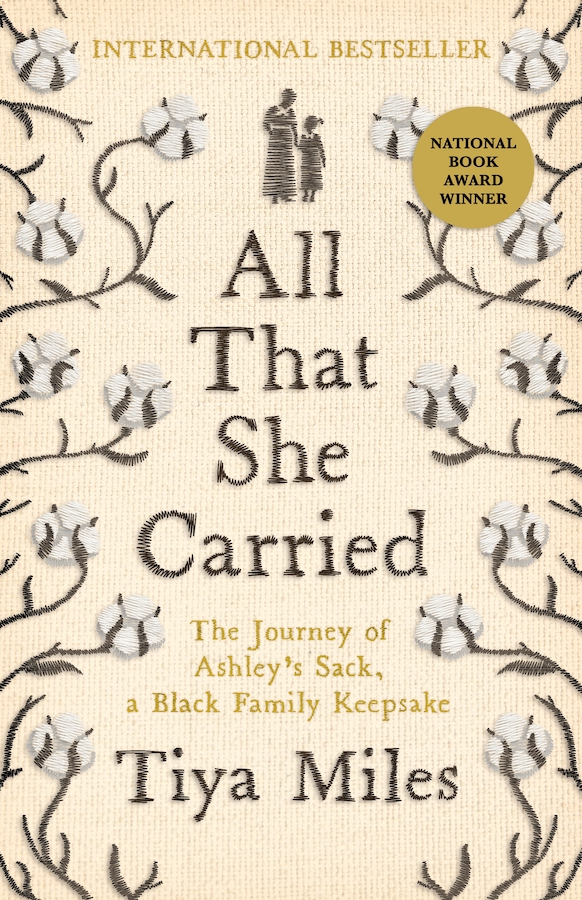
A Historian Reckons With Gaps in the Archives
Brooke Gladstone, host of WNYC Studios On the Media, asks Tiya about her meditative approach to history and her career as a historical fiction writer. Miles explains what she learned about the three women connected to Ashley’s sack through her research and imagination to consider what their lives looked like. Listen now.

Eight Books for the Preservationist in Your Life
Looking for a book to read over the holidays? The National Trust for Historic Preservation has a list of recommendations, including Tiya’s book All That She Carried, that will “further invigorate, inspire, and maybe expand the perspective of the preservationist in your life.” View the full list.
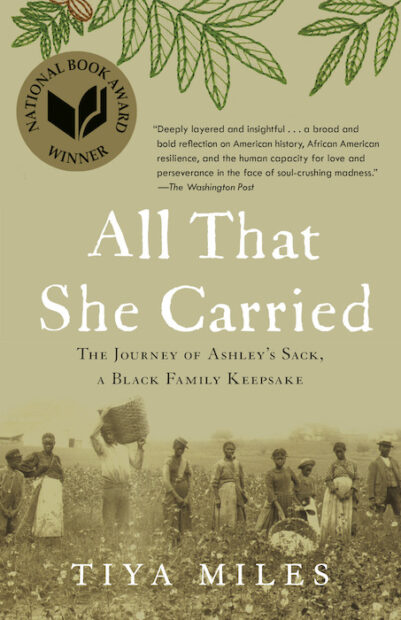
Behind the Mic: Janina Edwards on All That She Carried
Narrator Janina Edwards shares her experience narrating Tiya Miles’s National Book Award-winning All That She Carried: The Journey of Ashley’s Sack, a Black Family Keepsake.

Interview with South Writ Large
In her interview with South Writ Large, Tiya shares her inspiration, challenges, and intent behind her highly acclaimed book, All That She Carried: The Journey of Ashley’s Sack, a Black Family Keepsake. Read her interview.

How A Cotton Sack, Passed Down Over Generations, Tells A Larger Story About Slavery – NPR
In this interview Tiya talks with NPR’s Arun Venugopal about her book All That She Carried — highlighting the story of a single cotton sack passed down over generations; from Rose, an enslaved woman, who gives the sack to her young daughter Ashley before she is sold to eventually finding its way to her great-granddaughter Ruth who embroiders the sack Venugopal summarizes, “In the words of author Tiya Miles, this book is about the burdens of being human in an inhumane world, and about how Black women in particular have responded to systemic erasure with art, compassion and love.” Listen to Tiya’s interview (transcript available).

The Extreme History Project: The Dirt on the Past
Tiya talks with the hosts of the podcast The Dirt on the Past about her book All That She Carried: The Journey of Ashley’s Sack, A Black Family Keepsake — why she felt compelled to write about this significant object, her process, and why this story of resilience and of love passed down through generations of women is important today as we struggle with how to understand our hard histories and reconcile our past in a way that can help us move forward together.
Listen to the interview on Apple Podcasts.
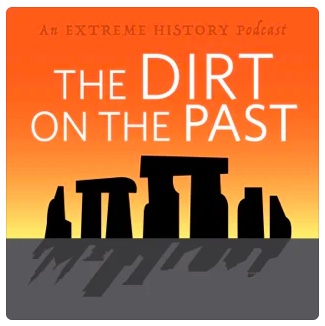
Understanding the Horror of Slavery Is Impossible. But a Simple Cotton Sack Can Bring Us Closer.
From pecans to maternal empathy; in a moving and thoughtful interview with Slate, Tiya shares some of what she felt and experienced researching and writing All That She Carried. Read the full interview.
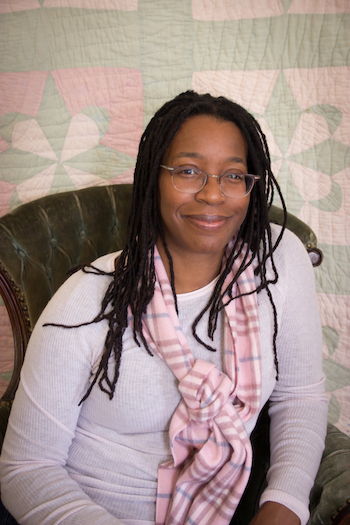
The Echoes of Artifacts in “All That She Carried”
“All That She Carried locates the spiritual and tangible archive in objects, places, and literature. This is not traditional history; here emotions are held with the same care and consideration as traditional sources. The goal is not simply to uncover the story of Ashley’s sack, but to unpack the meaning of material things in Black women’s lives from enslavement through Jim Crow segregation.” Read this review as it appears on Chicago Review of Books.
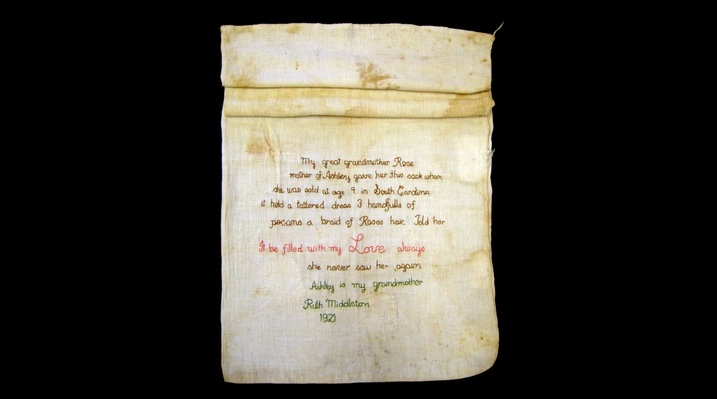
How the Survivors of Slavery Used Material Objects to Preserve Intergenerational Wisdom
‘Having been treated as possessions and deprived of ownership of themselves, their families, crops they nurtured, and objects they made and maintained, African American survivors of slavery recognized the world of things. They lived each day in haunted awareness of the thin boundary line between human and non-human, a thinness daily exposed and abused by slave societies. Despite the prominence of a Cartesian duality in Western philosophy that proposed a clear split between spirit and matter, enslaved Blacks knew that people could be treated like things and things prized over people.’ This piece is excerpted from Tiya’s book All That She Carried: The Journey of Ashley’s Sack, A Black Family Keepsake and can be read online at Literary Hub.
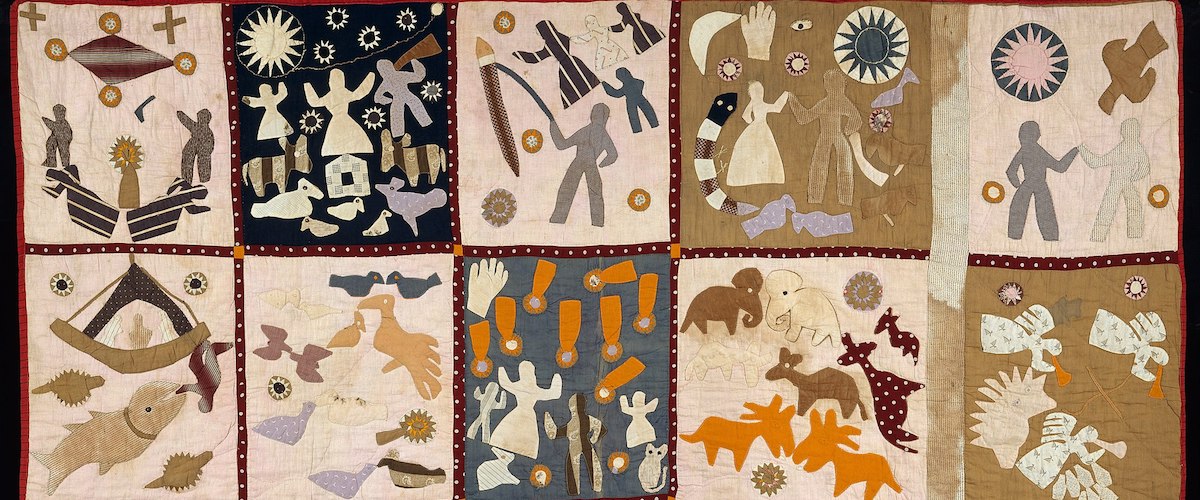
To Find the History of African American Women, Look to Their Handiwork
‘A granddaughter, mother, sewer, and storyteller imbued a piece of old cloth with all the drama and pathos of ancient tapestries depicting the deeds of queens and goddesses. She preserved the memory of her foremothers and also venerated these women, shaping their image for the next generations. Without Ruth, there would be no record. Without her record, there would be no history.’ This piece is excerpted from Tiya’s book All That She Carried: The Journey of Ashley’s Sack, A Black Family Keepsake and can be read online in The Atlantic.

The radical hope of Black motherhood
One family’s heirloom reveals a broader legacy: brilliant practicality in the face of terror. Read the full article in The Boston Globe.
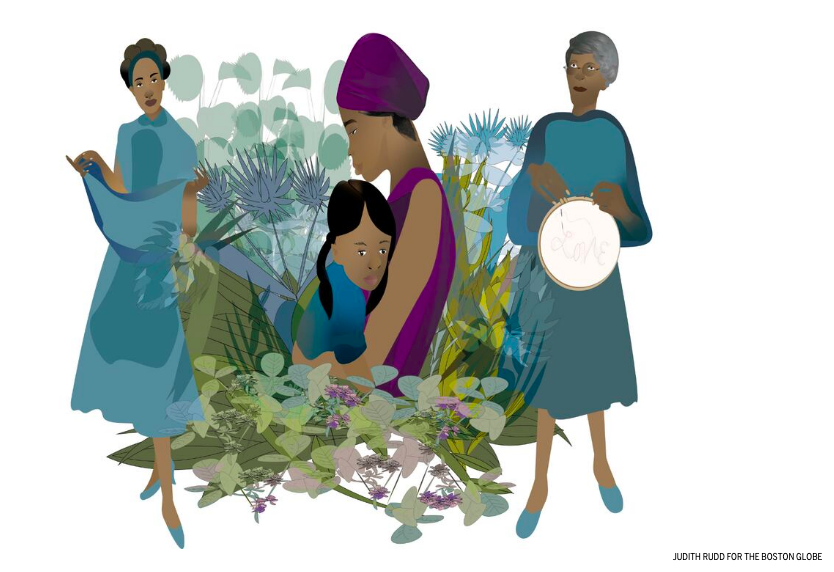
An Ordinary Treasure: PW Talks with Tiya Miles
Tiya was interviewed by Publishers Weekly on the material and symbolic significance of a cotton sack packed by an enslaved mother for her nine-year-old daughter, Ashley, the subject in her upcoming book All That She Carried (Random House, June 2021). Read the interview.

